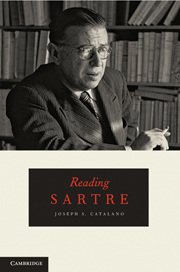3 - The Critique of Dialectical Reason
Published online by Cambridge University Press: 05 June 2012
Summary
We experience history first in our cribs and then through the artifacts of our home and our culture. This crafted world – what Sartre terms the “practico-inert” – envelops and follows us throughout life. But many situations follow us throughout our life, such as the ones described in part four of Being and Nothingness. In that earlier work, to be examined in the next chapter, Sartre had already discussed the relation between freedom and facticity under such headings as “My Place,” “My Past,” My Environment,” “My Fellowman,” and “My Death.” The practico-inert adds to these outlines of our human situation the awareness of a distinctive inertial system that frequently inhibits our best intentions. Thus, Sartre writes, “In other words, we shall reveal, through it [the practico-inert], that a permanent anti-praxis is a new and necessary moment of praxis” (1: 124–125). As we reflect upon Sartre's Critique in this chapter, returning in some detail to a study of the practico-inert, it is important to keep in mind that “praxis” is Sartre's term for human action precisely as it acts within an historical context, confronting the antipraxis of the practico-inert.
The human drama is now revealed in its full complexity. We are free; but our budding freedom develops in relation to an ambiguous totality resulting from the health of our body, the bonds among family, friends, and acquaintances, as all this meshes with the forces of history.
- Type
- Chapter
- Information
- Reading Sartre , pp. 43 - 68Publisher: Cambridge University PressPrint publication year: 2010



